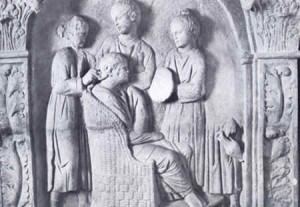 Since we started “Common Cents” last September, we’ve consistently stressed the importance of a consistent conservatism that defends both personhood and property. I have long stated that secularization always precedes socialization, for a country that loses its allegiance to God ultimately pledges its allegiance to government. This sentiment is well summed-up by T.S. Eliot who stated “If you will not have God (and He is a jealous God) you should pay your respects to Hitler or Stalin.” In the case of Rome, as the people were purged of their belief in a supernatural deity, which coincided with their devaluation of human life and personhood, they paid their respects to a defied Caesar.
Since we started “Common Cents” last September, we’ve consistently stressed the importance of a consistent conservatism that defends both personhood and property. I have long stated that secularization always precedes socialization, for a country that loses its allegiance to God ultimately pledges its allegiance to government. This sentiment is well summed-up by T.S. Eliot who stated “If you will not have God (and He is a jealous God) you should pay your respects to Hitler or Stalin.” In the case of Rome, as the people were purged of their belief in a supernatural deity, which coincided with their devaluation of human life and personhood, they paid their respects to a defied Caesar.
The Roman economy faltered and, ultimately, failed under the weight of its own immorality. As the deeply held religious values of the Roman people, which initially stressed rugged individualism, personal responsibility and family, faded, so did their foundation of freedom and free enterprise. The nation initially had a strong and robust economy, built on a thriving middle class. The rise of state power, however, led to decadence and moral relativism that culminated in class warfare. The Roman ruling class became enchanted with the philosophical sophistry of the Greeks, which stood in diametrical contrast to their belief in absolutes and moral principles. Thus, widespread moral relativity broke down any sense of a social ethic, and led to the rapid rise of slavery in the empire. As with America in the 19th century, the expansion of slavery destroyed the economy for all but the wealthy elites and created a bifurcated society seething with resentment.
Slavery, which devalues human life, put at risk economic security for all Romans; therefore, the devaluation of personhood led to the direct devaluation of private property rights and free enterprise. Slave labor crowded out the job market as rich aristocrats, who pulled the levers of the state, were unwilling to pay free laborers when slave labor was plentiful. This led to economic stagnation for all, except those who became fabulously wealthy from the spoils of the socialist state. In response, liberal Roman politicians like Tiberius and Gaius Gracchus instituted public dole (welfare) programs to repress impending revolution from the poorest Roman citizens. Thus, the wealthiest and the poorest Romans had economic security, and the middle class ceased to exist. That scenario sounds dangerously like America in this second decade of the twenty-first century.
While slavery was long ago abolished in our nation, and thank God for it, we do have a system of secular socialism that is taking over our economy. Thus, the spoils of the state go to the politically well-connected (i.e. – board members at Solyndra), and those who are content to completely live off of the state. In this current economic environment, wherein government is picking winners and losers, the middle class is rapidly disappearing and upward economic mobility is being undermined. Thus, we are now standing near the same economic spot as the Romans at the time of massive social upheaval and class warfare. As Senator Jim DeMint pointed out in his 2009 book Saving Freedom, it wasn’t the Caesars who wrecked Rome; it was class warfare. It is important to point out that class warfare was downstream of the Roman nation’s devaluation of human dignity.
In our time, an age of legalized abortion and the move toward utilitarian determinations of human life, personhood is, again, being undermined. This will further force our country toward secular socialism, wherein the state will determine our rights and allocate wealth and resources. We must restore the principles of personhood and property in America, if we’re to avoid the fate of personal and economic exploitation that destroyed the Roman economy and culture.
For America to avoid the fate of Rome, we must rebuild this nation from the bottom-up, not remake it from the top down. For the American Republic to avoid the freedom-crushing fate of empire and decline, we must get government out of the economy and restore upward economic mobility. This is only achievable when all people are respected equally by the rule of law. America can be restored, but it will take the active participation of her people, fighting for their God-given rights to life, liberty and property. If we remain silent in this moment, the great American experience of self government may forever fade from history.




